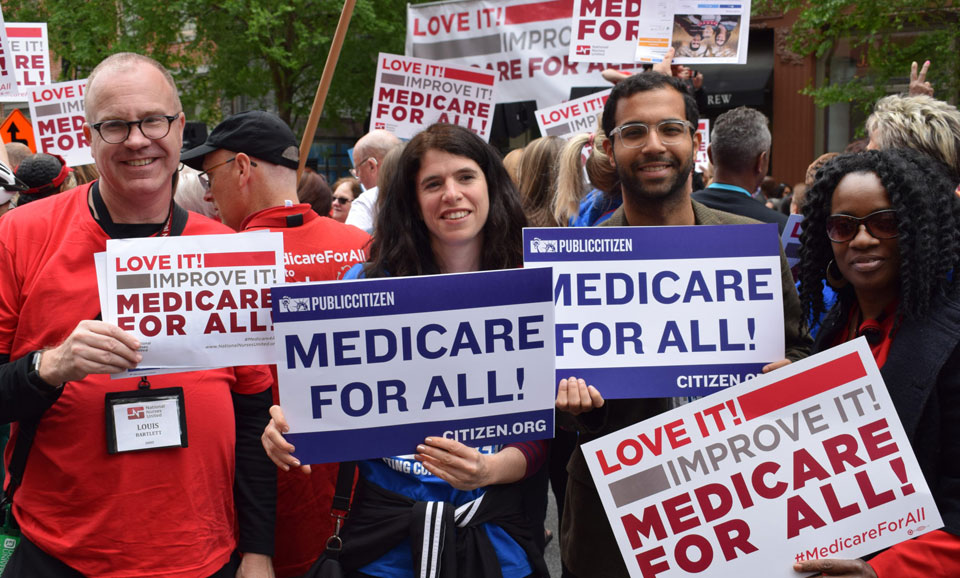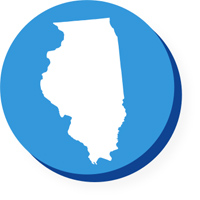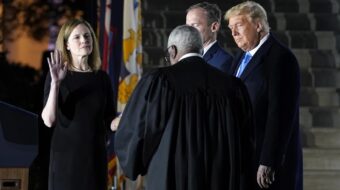
Polling indicates that Americans still give Donald Trump an edge over Joe Biden when it comes to their faith in either candidate’s ability to manage the economy.
While it’s true that, according to a late-August Reuters/Ipsos poll, Trump’s approval rating on the economy has dipped 14% since March, putting him in negative territory with 47% approving and 48% disapproving of his management of the economy, voters nonetheless see Trump as a better bet when it comes to serving their economic interests—despite the fact that the same poll revealed that 58% of respondents believed the economy was on the wrong track.
So why do Americans then view Trump as more capable than Biden when it comes to managing the economy?
After all, despite Trump’s false claims that he has created the greatest economy in U.S. history, we know that the recovery Biden helped orchestrate under Barack Obama’s presidency led to a record of consecutive months of positive job creation even though Obama inherited the Great Recession while Trump had a record-setting economy laid in his lap.
Is it the stock market highs? Is it Trump’s rhetoric of tax cuts, which belie the fact that his previous tax cut benefited the wealthy, did nothing to stem corporations laying off workers, and ballooned the deficit?
Trying to figure out exactly Americans understand “the economy” is something of a puzzle; it is not at all intuitive.
So, before we can even say, “It’s the economy, stupid,” we have to ask, “What is the economy?”
And it may be that having a new and more accurate language to talk about and understand all the features of American life that are part of the economy might alter the collective evaluation of Trump’s performance when it comes to the economy.
Take health care, for example. Health spending accounts for roughly 18% of our gross domestic product; it’s a substantial element of our economy, and health care consistently appears as a top, if not the top, issue concerning Americans this election. And a key issue for voters regarding health care is cost.
Yet, the language we use to talk about issues of “the economy” and of “health care,” tends to separate them into distinct rather than inextricably intertwined, indeed inseparable, issues.
A more accurate and precise political language would talk about health care in the same breath it talks about the economy.
Multiple polls indicate that voters have much more confidence in Joe Biden’s ability to implement healthcare policy that protects access and controls costs. A Kaiser Family Foundation poll conducted last June revealed that 53% of Americans trust Biden when it comes to healthcare policy while only 38% trust Trump.
That’s a fairly substantial margin by which Americans trust Biden over Trump with this rather enormous element of the economic well-being of American families. Yet health care doesn’t seem to be approached in polling as an economic issue. It is cordoned off, so to speak, as a discrete concern.
Obamacare is really called the “Affordable Care Act” for a reason. The Obama administration recognized precisely that access to affordable health care is indeed a chief economic challenge stressing America’s families. No doubt part of the reason Republicans refer to this historic healthcare legislation as “Obamacare” is to obscure the legislation’s economic benefits by rhetorically transforming the legislation into a matter of political personality.
Indeed, Public Policy Polling found in a survey conducted in early September widespread dissatisfaction with Trump’s persistent assault on the Affordable Care Act, particularly during the recent pandemic.
Likewise, this survey indicated Americans possess greater confidence in Biden to address the coronavirus pandemic, re-open schools safely, and develop a reliable and safe vaccine. All of these tasks, it is not hard to see, are parts of the foundational work, necessary premises, of re-opening the economy fully.
Again, these issues seem to be polled and talked about as issues separate from the economy.
Indeed, most key issues that concern Americans have a significant economic component to them.
Take education policy. Trump’s proposed 2020 budget called for massive cuts to education, and Secretary of Education Betsy DeVos has repeatedly attempted to divert public tax money to private schools, which would translate into a cut for the public schools upon which the majority of tax-paying Americans rely to educate their children. We know, of course, that investing in education promises to serve the health of the economy overall as well as helping individuals increase their earnings over the course of their lives, thus also creating more tax revenue. In short, cuts to public education are harmful to ordinary citizens as well as the overall health of the economy.
So, while Trump’s assault on public education promises to damage the economy and further undermine the economic well-being of American families, again education issues seem to be treated and talked about independently of economic issues.
And let’s not get started on the economic devastation that is resulting and will continue to result from not addressing climate change, which Trump views as yet another hoax, even though a study from his own scientists determined in 2018:
“Extreme weather and climate-related impacts on one system can result in increased risks or failures in other critical systems, including water resources, food production and distribution, energy and transportation, public health, international trade, and national security.”
Access to clean water, food, and energy is perhaps the most fundamental element of our economic lives.
Recognizing what constitutes “the economy” in all its multi-faceted dimensions and developing a language to talk more precisely and fully about Americans’ economic lives and interests are vital and urgent necessities for communicating and helping us determine our political interests and, frankly, for crafting sound economic policies that truly encompass and comprehend all the necessary elements that ensure the well-being of our families.
So, let’s be smart in talking about and understanding the economy before just mindlessly repeating, ‘It’s the economy, stupid.”












Comments